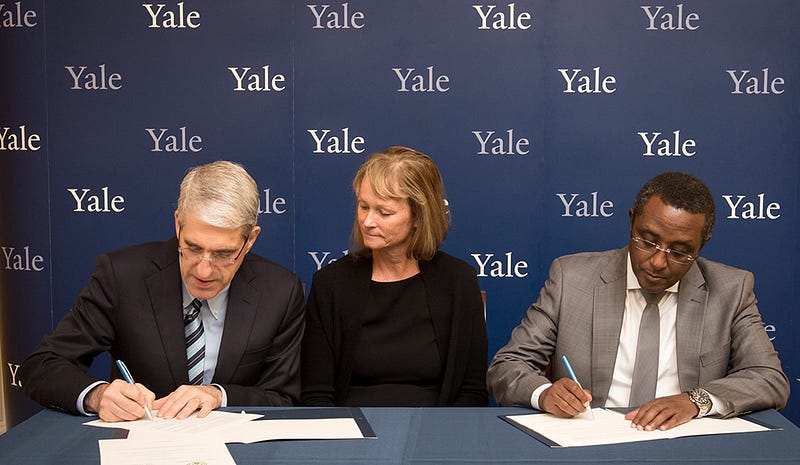Akilah Partners with Yale University
A Collaboration to Catalyze Sustainable Development and Environmental Conservation
By Karen Sherman, President of The Akilah Institute and the author of the forthcoming book Brick by Brick: Building Hope and Opportunity for Women Survivors Everywhere

President Peter Salovey and Rwanda’s Minister of Environment Vincent Biruta sign a Memorandum of Understanding (MOU) to foster greater cooperation and collaboration between Yale and the government of Rwanda. Yale School of Forestry Dean Ingrid C. (Indy) Burke also signed the MOU representing the first dean to officially commit to the partnership. Left to right: President Salovey, Yale School of Forestry Dean Ingrid C. (Indy) Burke, and Minister Biruta. (Photo credit: Stephanie Anestis)
The Government of Rwanda’s Ministry of Environment and Yale University’s School of Forestry & Environmental Studies have recently signed a memorandum of understanding outlining their joint commitment to advance sustainable development and environmental conservation in the country.
Notably, a key program partner with Yale in executing on this agreement is the Akilah Institute, Rwanda’s only women’s college.
Why Akilah?
Akilah has rooted its academic experience in sustainability education, which emphasizes leadership, critical thinking, collaboration, creativity, and moral character. These focal areas not only equip students with the knowledge and tools to balance vibrant economies with a healthy environment, but also give them a competitive edge in the workforce. Many of Akilah’s graduates are already actively pursuing careers in sustainability, including solar energy, water access, and sustainable agriculture.
“Our future graduates will drive sustainability innovation around the world, where conversations on circular economy, women’s empowerment, business, climate action, microgrids, clean energy solutions, smart city innovation, and more, will all converge,” said Akilah co-founder and CEO Elizabeth Dearborn Hughes.
Why Africa?
While the African continent contributes less than 4 percent of the world’s greenhouse gas emissions, it is the most vulnerable to the effects of climate change.Those effects include everything from severe water shortages to extreme droughts and floods. Human adaptation to climate change is projected to create millions of new jobs in Africa by 2030, among them engineers and technicians to improve access to clean water, sanitation, and solar lighting. Especially in Africa, but also around the world, sustainability is not a choice but a necessity and a responsibility.
Why Rwanda?
As Rwandan President Paul Kagame has said:
“The environment is at the heart of Rwanda’s development. By protecting our natural heritage, including the endangered mountain gorilla and ancient rainforests, and by involving everyone in conservation, we are ensuring that our development is sustainable and brings prosperity to all citizens. These efforts are driven by shared political will and a commitment to a bright future for generations to come.”
The Rwandan government is widely considered to be a leader in sustainability. In 2011, Rwanda adopted a national strategy for climate change and low carbon development. In addition to banning the use of plastic bags in the country in 2008, Rwanda embarked on a major reforestation campaign, catalyzed a green growth fund that has created more than 130,000 jobs, increased investments in hydroelectric and solar power, and introduced a roadmap for the development of six sustainable cities.
What will the collaboration look like?
The partnership between Yale and Akilah will manifest through the launch of a unique, open workspace where students, graduates, faculty, and partners come to network and collaborate. The workspace will initially be housed on the Akilah campus and serve as a hub for their mutual sustainable development efforts. The mission of the partnership will be to extend the boundaries of what is possible in sustainable innovation — from joint certificate programs in environmental leadership to green chemistry labs to collaborative teaching and symposia on sustainability.
“I’m excited about this partnership with Akilah. The young women of Rwanda will play a key role in Rwanda’s sustainable future,” says Parfait Gasana.
Gasana is a Yale alumnus of the School of Forestry and Environmental Studies and lead negotiator of the memorandum, which advances the university’s Africa Initiative to promote greater collaboration on the continent.
The partnership formally kicks off in May 2019. Together Akilah and Yale will catalyze a broad network of experts, business leaders, researchers, and practitioners who can help implement new ideas as well as provide meaningful opportunities for students, faculty and alum to become sustainable citizens through teaching, research, exchanges and scholarships.
The changing global environment presents unprecedented challenges and opportunities, with important implications for the future of education and work. These kinds of policy-academic partnerships have the potential to impact both, and at the same time, promote greater environmental stewardship and sustainability in Rwanda and across Africa.
